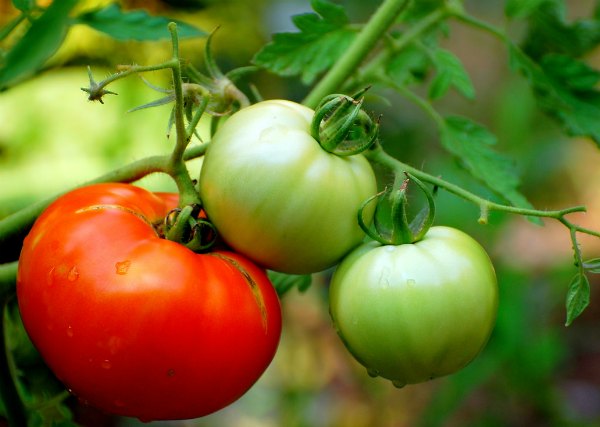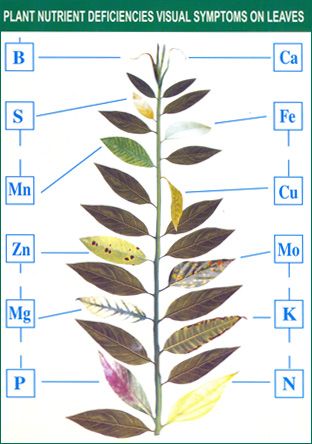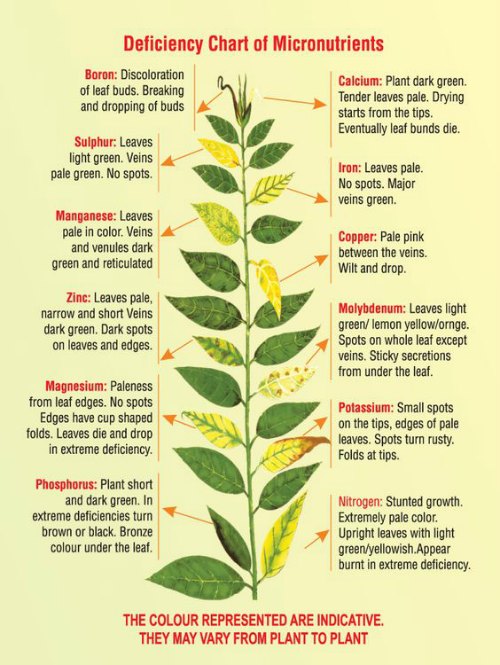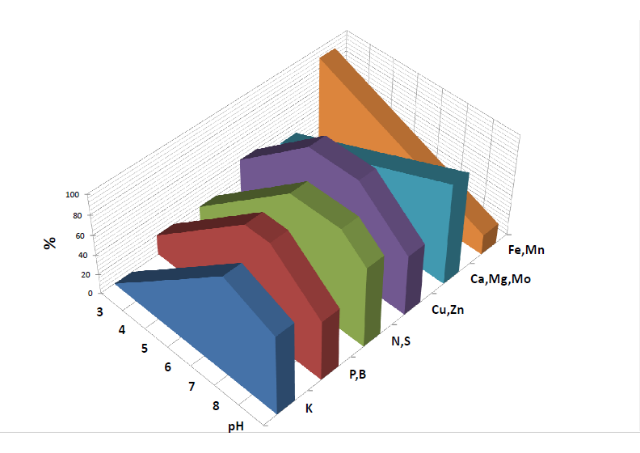Plant Nutrients Vs Pesticides: Know How Mineral Nutrients Prevent Plant Disease
s
Plant Pesticides (which is toxic in nature) are given to the plant by foliar spray to kill insects (by using insecticides), weeds (by using herbicides), fungus (by using fungicides) and make the plants disease-free. However, these plant pesticides kill not just harmful organisms, but also useful soil microorganisms, insect species, and worms which maintain the health of the soil and even limit the population of the pests naturally. Besides, plant pesticides have a tendency to deteriorate immune system and the root system of the plant as it reduces the concentrations of essential plant nutrients in the soil such as NPK – Nitrogen, Phosphorous and Potassium.
This is the reason why farmers need to get rid of these toxic chemicals as soon as possible. However, the question remains – If not Pesticides, then what? No wonder, farmers have to protect and safeguard their plants from insects, weeds, fungus, insects, rodents and other harmful micro-organisms. Here, we share about the fighting mechanism “ Plant Nutrients ” that do not allow the pest to inhabit in and around the plant or stagnate its growth.
Image Courtesy: Manjith Kaini via Flickr
Know About Plant Nutrients and How It Works
In all, there are 20 nutrients that are necessary for a plant’s growth and development. –
Natural Nutrients (available naturally in the atmosphere) – Oxygen (0), Hydrogen (H), Carbon (C) and Chlorine (Cl)
Major Nutrients comprises of Nitrogen (N), Phosphorous (P), Potassium (K)
Secondary Nutrients comprises of Calcium (Ca), Magnesium (Mg) as well as Sulphur (S) and, Selenium (Se) and Silicon (Si)
Micro Nutrients includes Iron (Fe), Manganese (Mn), Zinc (Zn), Copper (Cu), Molybdenum (Mo), Boron (B), Nickel (Ni), and Cobalt (Co)
Each of the 20 plant nutrients plays an important role in plant metabolism. No other nutrient can replace other nutrient as far as the functionality is concerned. This is the reason why a farmer has to ensure that he adopts the method of BPN (Balanced Plant Nutrition) by applying all the necessary nutrients including the micronutrients and not just major nutrients NPK (Nitrogen Phosphorus Potassium).
Image Courtesy: Deficiency of Plant Nutrients via Pinterest
There are not one but many advantages of BPN. Firstly, it avoids antagonism between the essential nutrients, and reduces environmental pollution. Secondly, it not just maintains the soil productivity and health but also the fertility of the soil for a longer period of time. Lastly, there is a tremendous quantitative as well as qualitative increase in crop yield. With Balanced Plant Nutrition, the crop exhibits increased resistance against diseases and pest attacks. So, why would a farmer need pesticides when the crop would be disease-free with zero tolerance towards pests and pathogens.
Balanced Plant Nutrients Protects the Crop from Pests and Insects
Adopting Balanced Plant Nutrition reflects healthy vegetative growth and seldom articulates nutrient deficiency symptoms. Also, the healthier stand of crop demonstrates increased resistance against diseases, pests and other abiotic stress in the environment.
Image Courtesy: University of Arizona Cooperative Extension via Pinterest
Check out the disease resistance properties of Macro Nutrients and Micro Nutrients
- Selenium, a beneficial nutrient protects plants from insects as it acts as a repellent against spider mites, aphids and caterpillars that feed on plants. Even a small amount of Selenium is toxic to these pests.
- Selenium acts as a resistant to fungal disease in almost all the plants especially in Indian mustard.
- Silicon produces tough cell wall thus reducing the severity of fungal attack specifically for foliar pathogens. It also acts as a physiological barrier for penetration of fungal hyphae and their growth.
- Silicon also inhibits the growth and feeding ability of viruses that are transmitted to the crop by fungi and sucking insects. This is how Silicon reduces virus infection
- Nickel is effective in protecting Paddy against Brown spot (Cochliobolus miyabeanus) and Blast (Pyricularia oryzae)
- Nickel increases disease resistance in a crop and reduces severity of Rust, Scab, Little leaf, leaf curl and Rosetting.
- Proper dosage of Potassium in vegetable increases its resistance to several diseases while slight deficiency might attract infections and insects. Potassium is widely reported to decrease insect infestation in many host plants these include fungal diseases, insects and mites, viruses, nematodes and harmful bacteria.
- Magnesium is an important contributor to the overall plant health. It’s specific mechanism acts as a defence against soft rotting pathogens and acts as a wall to several diseases like Wilt, and Bacterial Blight in Cotton, Fungal diseases in wheat, Root rot in Soybean, Gangrene in Potato, Leaf spot in Peanut, Rice and Caster beans etc.
- Having the capacity to develop stronger tissues and cell walls, Calcium doesn’t allow fungi and to penetrate across the surface cells and thus acts as a barrier to fungus Also, it doesn’t allow the bacteria to spread in the plant tissue. In addition, Calcium neutralizes poisons produced in plant.
In short, if the soil has necessary Macro as well as Micronutrients required for the crop that you are growing, the crop will not attract any fungal, viral, bacterial infections or weeds and rodents that normally damage the crop and also affect its yield.
This method of plantation abolishes the use of harmful pesticides totally, mainly because –
- It acts as a mechanical barrier (by increasing the thickness of the cell wall)
- It easily disrupts the growth cycle of several pathogens by synthesizing necessary natural defence compounds such as phytoalexins, antioxidants and flavonoids.
 In addition, the nutrients applied from foliar spray enter through stomata or stoma, specializes pores in the leaves that are primarily engaged in transpiration and gaseous exchange during the process of photosynthesis. Foliar spray instantly supplies all the necessary nutrients in their readily available form when the plant is under stress or exhibiting nutrient deficiency symptoms.
In addition, the nutrients applied from foliar spray enter through stomata or stoma, specializes pores in the leaves that are primarily engaged in transpiration and gaseous exchange during the process of photosynthesis. Foliar spray instantly supplies all the necessary nutrients in their readily available form when the plant is under stress or exhibiting nutrient deficiency symptoms.
Foliar Spray is an excellent tool for combating adverse conditions like adverse soil ph, prolonged water stress, incessant wet conditions and temperature changes, rejuvenation in the post-harvest stage.
Organic Matter That Acts as Plant Nutrients and Pest Killers
Still, if there is any pest or insect attack due to climatic conditions and lack of micro nutrient in the soil and plant leaves then you can safely use Neem oil instead of any insecticides, fungicides or pesticides. Neem oil has tremendous qualities to kill more than 200 types of known and unknown insects and can easily control any pest attack. The best quality of neem oil is that it only kills insects that are harmful to crop and environment and saves all the micro-organisms that are useful to the soil and crop.
To get relief from any inorganic fertilizer, farmers can use Vermi Compost mixed with Neem Cakeand Bone Meal as soil stabilizer and as a basal dose at the time of land preparation before sowing or plantation. And a foliage spray of Potassium humate at later stage.
Vermi compost has all the major secondary and micro nutrients which are quite sufficient for the plant growth. It is very rich in supplying Nitrogen to the plant from time to time. It supplies the nutrients when the plant is in need from time to time and it keeps the balance nutrient reserved in the soil. Similarly, Neem Cake is very rich in supplying NPK to the plant. Bone meal is the bone of the animals and the richest source of phosphorous. Potassium humate (rich in potassium) is totally organic and supplies potassium from time to time in the plant. By applying these four organic substances, the plants get complete nutrient to build its immune system and protect itself from all types of pests. By providing these organic matters in appropriate doses the farmer will get maximum yield of the crop that he plants.
Know How to Increase Macro and Micro Nutrients to Fight Plant Pesticides
One can easily get macro and micro nutrients from the soil. The best solution is to test the soil and get the pH value of the soil checked. The prime objective of this test is to bring the pH of the soil at 7. If after testing the pH of the soil is acidic (4 to 6) use lime/dolomite to bring the pH of the soil to 7 and if the pH is above 8.3 use gypsum/magnesium sulphate to bring the pH to 7. As most plant nutrients are available to the crop plant within the pH range of 6.5 to 7.5, it is beneficial to neutralize the soil before plantation. At a neutral pH, the existing soil nutrients are unlocked and are readily available for the plant intake.

Image Courtesy: Mid Klamath Watershed Council
Otherwise, if the pH is greater than 7.5 (Alkaline pH ), phosphate ions will react with Calcium and Magnesium to form less soluble compounds and at acidic pH values (less than 5), phosphate ions will react with Iron and Aluminum to form less soluble compounds. In addition, most of the plant nutrients especially micro nutrients are less available if the pH of the soil goes above 7.5.
This is the reason why soil pH plays a crucial role in neutral availability. Do keep the pH factor in consideration while planning nutrient management programme to increase the resistance of the crop from various pests and diseases.

Image Courtesy: By Ninjatacoshell (Own work) [CC BY-SA 3.0 (http://creativecommons.org/licenses/by-sa/3.0) or GFDL (http://www.gnu.org/copyleft/fdl.html)], via Wikimedia Commons
Reference:
Do Not Miss Reading:




Hi, Neat post. There is an issue with your web site in web explorer, would test this¡K IE nonetheless is the market leader and a large element of folks will omit your excellent writing because of this problem. AMREP North America
ReplyDeleteشركة تنظيف منازل بابها
ReplyDeleteشركة تنظيف بابها
شركة تنظيف منازل بأحد رفيدة
شركة تنظيف بوادي بن هشبل
شركة تنظيف منازل بوادي بن هشبل
شركة تنظيف منازل ببيشة